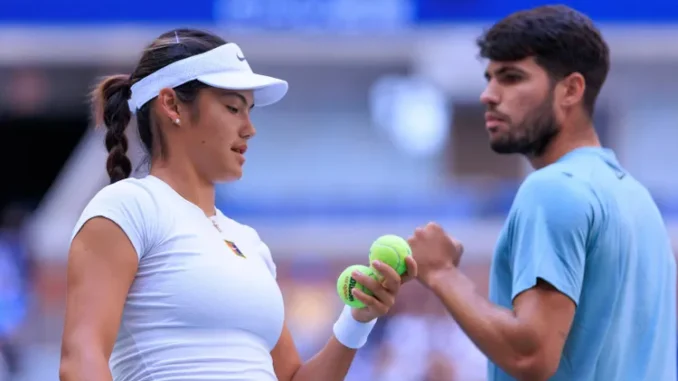
In the ever-evolving tapestry of tennis tales, where underdogs rise and legends are forged in the heat of improbable battles, few stories grip the imagination like a qualifier’s charge to glory. The sport’s rich history is dotted with these Cinderella moments, but when retired American powerhouse John Isner stepped into the fray with a bold proclamation, he ignited a firestorm of discussion among fans and pundits alike. On a recent episode of the Nothing Major Podcast—a lively roundtable hosted by Isner alongside fellow ex-pros Sam Querrey, Jack Sock, and Steve Johnson—the conversation turned to the jaw-dropping exploits of Monegasque sensation Valentin Vacherot at the 2025 Shanghai Masters. Querrey, ever the provocateur, posed the ultimate question: “Is this a more impressive run than Raducanu qualifying and winning the US Open, or can you compare them?”
Isner, the towering serve specialist who once etched his name in tennis lore with the longest match in Wimbledon history, didn’t hesitate. Leaning into the mic with the confidence of a man who’s seen it all from the baseline, he delivered a verdict that raised eyebrows worldwide. “I think it is more impressive, yes,” Isner asserted. “[For Raducanu] it’s a bigger story because it’s the US Open, but I think this is more improbable than what she did. But her winning the US Open makes it a bigger story, even though this story is really big in the tennis world. I am giving it to Vacherot there. It’s just unheard of.”
To understand the weight of Isner’s words, one must delve into the extraordinary paths of both players. Vacherot, a 28-year-old journeyman ranked a lowly 204th entering Shanghai, wasn’t even a blip on most radars. Yet, he scripted a narrative straight out of a sports movie, navigating through two qualifying rounds before embarking on a seven-match rampage in the main draw. His victims included seasoned campaigners like Laslo Djere, Alexander Bublik, Tomas Machac, and Tallon Griekspoor in the early stages. The real drama unfolded in the quarters, where he dispatched rising star Holger Rune, followed by a seismic upset in the semifinals against none other than 24-time Grand Slam titan Novak Djokovic. The climax? A gritty final against his own cousin, Arthur Rinderknech, which Vacherot claimed 4-6, 6-3, 6-3. This victory not only marked him as the third qualifier ever to win a Masters 1000 title but also the lowest-ranked champion in the series’ history since its inception in 1990. Overnight, Vacherot vaulted into the top 40, transforming from obscurity to overnight sensation.
Contrast this with Emma Raducanu’s meteoric ascent in 2021, a run that still echoes as one of tennis’s most enchanting fairy tales. At just 18, fresh from high school exams and ranked 150th, the British prodigy arrived at Flushing Meadows as a wildcard qualifier with zero expectations. What followed was nothing short of miraculous: 10 consecutive wins—three in qualifying and seven in the main draw—without surrendering a single set. She dismantled Stefanie Vogele, Zhang Shuai, Sara Sorribes Tormo, and Shelby Rogers in the opening rounds, then powered past Olympic champion Belinda Bencic in the quarters and Maria Sakkari in the semis. The final against fellow teen Leylah Fernandez was a poised masterclass, sealed 6-4, 6-3. Raducanu became the first qualifier in the Open Era to capture a Grand Slam, the youngest Slam winner since Maria Sharapova in 2004, and Britain’s first female major champion in 44 years. It was a flawless, pressure-defying odyssey that catapulted her into stardom, complete with a $2.5 million payday and a surge into the top 25.
Isner’s comparison, while acknowledging the grandeur of Raducanu’s achievement, hinges on the sheer improbability of Vacherot’s feat in a stacked ATP field. He points to the Monegasque’s conquest of established elites like Djokovic—a feat Raducanu didn’t face in her draw, which, while formidable, lacked some top-10 heavyweights due to absences. Yet, this take hasn’t landed without backlash. Tennis Twitter erupted with fans defending Raducanu’s legacy, decrying recency bias and emphasizing her youth and inexperience. “Ridiculous claim. The best players weren’t even there,” one supporter fired back, while another highlighted: “Emma was 18, playing only her second grand slam event and hadn’t even won a match on the WTA tour. She won 10 matches and Vacherot 9.” A third added, “This recency bias is ridiculous lol. Emma won the US Open as a QUALIFIER without dropping a single set. Yes Vacherot’s run was impressive too but its nowhere near Emma’s achievement.”
Others echoed the sentiment of protectiveness around Raducanu, who has battled injuries and form dips since her triumph, recently reaching quarters in Ningbo but opting for an early season end to prioritize health. “People are so twisted when it comes to Emma Raducanu. She won a slam. Her win as a qualifier >>>,” one fan insisted. Even neutral observers noted, “What a horrible take,” underscoring the divide. Some, however, sided with Isner, arguing Vacherot’s path through Djokovic and other top talents in a Masters event—albeit not a Slam—added an extra layer of shock value. “You can only play who is in front of you,” a commenter reminded.
Isner, now enjoying retirement after a career highlighted by 16 ATP titles and that epic 70-68 fifth-set marathon against Nicolas Mahut in 2010, brings a player’s perspective to these debates. His podcast has become a hub for unfiltered insights, blending humor with hard-hitting analysis. For Vacherot, this endorsement caps a life-changing week, securing him spots in future majors and a newfound confidence. As for Raducanu, at 22, she’s rebuilding with coaching changes and a focus on consistency, eyeing a strong 2026.
In the grand scheme, Isner’s words remind us that tennis thrives on these comparisons—they fuel passion, spark rivalries, and celebrate the unpredictable. Whether Vacherot’s Shanghai stunner truly eclipses Raducanu’s New York magic is subjective, but one thing’s certain: both runs embody the sport’s enduring allure, where a single tournament can rewrite destinies. As the tour marches on, fans will debate, but the magic of these moments? That’s timeless.
Leave a Reply